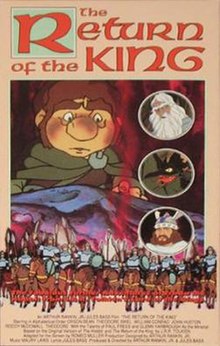The Return of the King (1980 film)
| The Return of the King | |
|---|---|
 Original VHS release cover | |
| Based on | The Hobbit and The Return of the King by J. R. R. Tolkien |
| Written by | Romeo Muller |
| Directed by |
|
| Starring | |
| Theme music composer | Glenn Yarbrough |
| Composer | Maury Laws |
| Country of origin | |
| Original language | English |
| Production | |
| Producers |
|
| Running time | 98 minutes |
| Production companies | |
| Original release | |
| Network | ABC |
| Release | May 11, 1980 |
| Related | |
| The Hobbit | |
The Return of the King (also known as The Return of the King: A Story of the Hobbits) is a 1980 American-Japanese
The special aired on
Plot
At Bilbo Baggins's 129th birthday party in Rivendell, his nephew Frodo explains why he is missing a finger from his hand while the Minstrel of Gondor sings a ballad that tells the story of the quest to destroy the One Ring and defeat the Dark Lord Sauron.
In
Meanwhile, the wizard
At the same time, Gondor's neighbouring country,
On Mount Doom, Frodo succumbs to the Ring's power and puts it on, becoming invisible. Sam discovers Gollum and Frodo fighting over the Ring, which results in Gollum's biting off Frodo's finger to claim it. While dancing with joy at the retrieval of his "precious", Gollum falls into the lava of Mount Doom, taking the Ring with him. The Ring is destroyed, and Sauron perishes. Sam and Frodo are rescued by the
The story concludes with Frodo accompanying Bilbo, Gandalf, and
Cast
The voice cast is as follows:[3]
- Orson Bean – Bilbo, Frodo[4]
- Nellie Bellflower – Éowyn
- Theodore Bikel – Aragorn
- William Conrad – Denethor
- Uruk-hai
- John Huston – Gandalf
- Merry[5]
- Roddy McDowall – Sam
- Pippin[6]
- Easterling
- John Stephenson – Lord of the Nazgul, Gondorian Guard
- Brother Theodore – Gollum (credited as Theodore)
- Glenn Yarbrough – The Minstrel
Production
After the 1977 broadcast of The Hobbit on
The release was threatened by a lawsuit filed by the
The film is often mistaken for a sequel to Ralph Bakshi's 1978 animated film The Lord of the Rings. After Rankin/Bass became defunct in 1987, Warner Bros. acquired the rights to the special for home video distribution and chose to market the film, along with The Hobbit, as instalments of an animated Tolkien trilogy, with Bakshi's The Lord of the Rings (by then also owned by Warner Bros., from United Artists) acting as the middle chapter. This false promotion led to rumours that Rankin/Bass had originally decided to produce The Return of the King upon hearing that Bakshi's sequel to The Lord of the Rings had been cancelled. However, Rankin/Bass had always planned on making The Return of the King as a follow-up to their production of The Hobbit, even before the release of Bakshi's film.[7][page needed]
Reception
The film has garnered mixed reviews from modern sources. Charles Cassidy of Common Sense Media gave it a score of 3/5, and said, "Cartoon tale is darker, more complex than others in series".[8] Steven D. Greydanus of Decent Films Guide gave it a C, and said, "Works even less well than The Hobbit, which really is a children's story… overbearing folk-ballad soundtrack doesn't even gesture lyrically to Tolkien's poetry".[9] On the review aggregator website Rotten Tomatoes, 67% of 15 critics' reviews are positive, with an average rating of 5.90/10.[10]
Director
Home media
The Return of the King was first released on
References
- ^ Newspapers.com.
- ^ Tolkien Online: The Return of the King Archived 2011-11-20 at the Wayback Machine
- ^ "The Return of the King". Behind the Voice Actors. Retrieved 17 February 2021.
- ^ Hoffman, Jordan (8 February 2020). "Orson Bean, Legendary Character Actor, Killed in Accident at 91". Vanity Fair. Retrieved 5 April 2020.
- The Los Angeles Times.
- ^ "Peregrin 'Pippin' Took". Behind the Voice Actors. Retrieved 18 May 2020.
- ISBN 978-1282283268.
- ^ Cassady, Charles (9 July 2010). "The Return of the King (1980)". commonsensemedia.org.
- ^ Greydanus, Stephen. "The Return of the King (1980)". decentfilms.com.
- ^ "The Return of the King". Rotten Tomatoes. Fandango Media. Retrieved 17 June 2023.
- ^ "Arthur Rankin Jr., Interview at the Museum of Television & Radio (2003) - Part 2". YouTube. Archived from the original on 2021-12-05.
External links
- The Return of the King at IMDb
- The Return of the King at AllMovie
- Screen captures from the CED edition. Also features links to galleries of screen captures from other Tolkien animated films.
